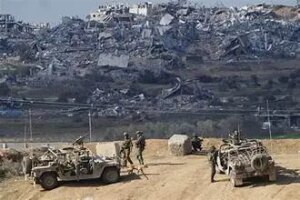The Humanitarian Crisis in Gaza: A Deep Dive into Current Events

As the humanitarian crisis escalates in Gaza, the plight of over 2.1 million individuals facing starvation has largely gone unnoticed by the international community. The reality on the ground is dire, with Israel announcing intentions that could lead to the devastation of the region.
The Current Situation
Hamas leaders have publicly expressed the futility of ongoing talks or ceasefire proposals amidst what they term a "hunger war" and an "extermination war." Basem Naim, a senior official, stated, “There is no sense in engaging in talks as long as the suffering continues.” Meanwhile, Israeli Finance Minister Bezalel Smotrich has made chilling statements regarding the population transfers, claiming that “Gaza will be entirely destroyed,” with plans to evict civilians into what they term “humanitarian zones.”
Israel’s Strategy: Operation Gideon’s Chariots
Israel’s approach, known as Operation Gideon’s Chariots, marks a significant escalation in military operations, poised to “conquer the Gaza Strip and hold the territories.” This scorched Earth policy raises serious concerns about the implications for both civilian lives and international law. Smotrich insists that the world should acknowledge Israel’s "occupation," clearly signaling a shift towards a full-scale offensive.
Humanitarian Implications
Reports indicate a troubling decline in Gaza’s population, with estimates suggesting a decrease of 160,000 people—about 6%—since the war began. Many casualties are civilians, unable to escape due to border closures and a lack of options for fleeing. The Rafah Crossing into Egypt was shut down in March, largely due to diplomatic tensions stemming from the 1979 peace treaty, and the Erez Crossing has similarly been sealed to Palestinian refugees.
The Refugee Crisis
Neighboring countries are struggling with the influx of refugees. While Lebanon and Jordan initially accepted many fleeing individuals, they have since tightened their borders. Alternatives like Greece, Belgium, Turkey, and Germany offer limited hope, with Canada launching special immigration measures that provide financial support to refugees—albeit only for those who manage to escape Gaza.

Policy & Geopolitical Repercussions
The upcoming visit of U.S. President Donald Trump to Israel is anticipated to catalyze the next phases of Operation Gideon’s Chariots. It remains crucial to unpack the geopolitical context—a landscape where neoconservative interests are pushing for a more aggressive U.S. stance in the Middle East as a counter to Russian influence.
The Economic Angle: Aid and Global Responsibility
The U.S. has historically provided substantial financial support to Israel, totaling an estimated $12 billion during Trump’s administration alone, on top of the existing $3.3 to $3.8 billion in annual aid. However, the question arises: who bears responsibility for the potential fallout of this humanitarian catastrophe?
At Extreme Investor Network, we believe that informed discussions around economic implications and the international response are vital. The ongoing situation presents an opportunity for investors and policymakers alike to rethink their strategies in the face of humanitarian crises, particularly concerning ethical investment and corporate social responsibility.
Conclusion: A Call for Awareness
As events unfold, it’s essential for citizens and investors around the world to remain engaged and informed about the humanitarian and economic implications of the crisis in Gaza. At Extreme Investor Network, we aim to provide insight that transcends headlines, encouraging readers to explore how the evolving geopolitical landscape impacts global economics.
By fostering a deeper understanding of these complex issues, we can contribute to conversations that may ultimately reshape responses to such dire human circumstances. Stay tuned to Extreme Investor Network for continuous updates and analyses on the intersection of economics and global affairs.

